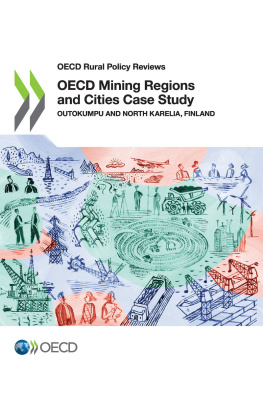OECD - Enhancing Productivity in UK Core Cities
Here you can read online OECD - Enhancing Productivity in UK Core Cities full text of the book (entire story) in english for free. Download pdf and epub, get meaning, cover and reviews about this ebook. year: 2020, publisher: OECD Publishing, genre: Politics. Description of the work, (preface) as well as reviews are available. Best literature library LitArk.com created for fans of good reading and offers a wide selection of genres:
Romance novel
Science fiction
Adventure
Detective
Science
History
Home and family
Prose
Art
Politics
Computer
Non-fiction
Religion
Business
Children
Humor
Choose a favorite category and find really read worthwhile books. Enjoy immersion in the world of imagination, feel the emotions of the characters or learn something new for yourself, make an fascinating discovery.
Enhancing Productivity in UK Core Cities: summary, description and annotation
We offer to read an annotation, description, summary or preface (depends on what the author of the book "Enhancing Productivity in UK Core Cities" wrote himself). If you haven't found the necessary information about the book — write in the comments, we will try to find it.
OECD: author's other books
Who wrote Enhancing Productivity in UK Core Cities? Find out the surname, the name of the author of the book and a list of all author's works by series.
Enhancing Productivity in UK Core Cities — read online for free the complete book (whole text) full work
Below is the text of the book, divided by pages. System saving the place of the last page read, allows you to conveniently read the book "Enhancing Productivity in UK Core Cities" online for free, without having to search again every time where you left off. Put a bookmark, and you can go to the page where you finished reading at any time.
Font size:
Interval:
Bookmark:

OECD (2020), Enhancing Productivity in UK Core Cities: Connecting Local and Regional Growth , OECD Urban Policy Reviews, OECD Publishing, Paris, https://doi.org/10.1787/9ef55ff7-en .
The information in this document with reference to Cyprus relates to the southern part of the Island. There is no single authority representing both Turkish and Greek Cypriot people on the Island. Turkey recognises the Turkish Republic of Northern Cyprus (TRNC). Until a lasting and equitable solution is found within the context of the United Nations, Turkey shall preserve its position concerning the Cyprus issue.
The Republic of Cyprus is recognised by all members of the United Nations with the exception of Turkey. The information in this document relates to the area under the effective control of the Government of the Republic of Cyprus.
While productivity might seem an abstract concept, it has important consequences on peoples daily lives. The amount of output that workers are able to produce within a given time and with a given amount of resources is a critical determinant of the material well-being in a society. As resources are finite, productivity growth is the only way to increase living standards in the long term.
Raising productivity is of particular relevance to Core Cities, eleven large second-tier cities located across the United Kingdom (Belfast, Birmingham, Bristol, Cardiff, Glasgow, Leeds, Liverpool, Manchester, Newcastle, Nottingham and Sheffield). Core Cities and the functional urban areas around them account for almost a quarter of the UK economy. Yet their productivity levels are below the UK average and significantly below the levels of similar-sized cities in other OECD countries. At a time when productivity growth in the UK has been weak for more than 10 years, the UK can no longer afford to have such a significant part of its territory perform well below its potential.
This report analyses the reasons behind low productivity levels in Core Cities and provides policy recommendations to help national and local policy makers foster productivity growth. Drastic differences in productivity across places within a country, such as they exist in the UK, cannot be addressed by national policies that apply uniformly across a country. They are often due to specific local circumstances. Thus, helping places redress their productivity levels requires identifying the specific causes and addressing them through targeted place-based policy action.
While Core Cities share some similar challenges, each Core City is unique and no one-size-fits-all solution could be applied across the board. While it is beyond the scope of this report to delve into the specific circumstances in each of the eleven cities, policy makers are encouraged to further tackle the city-specific determinants of productivity and develop targeted strategies.
The relevance of this report goes beyond the UK context. The subnational dimension of productivity is gaining increasing attention in OECD member countries, and the lessons learned from UK Core Cities can be valuable for second-tier cities in other national contexts. More generally, the recommendations from this report contribute to a growing knowledge base that helps struggling places all over the OECD to realise their full potential.
This review was produced by the OECD Centre for Entrepreneurship, SMEs, Regions and Cities (CFE) led by Lamia Kamal-Chaoui, Director. It is part of the Programme of Work of the OECD Regional Development Policy Committee.
The report and the underlying policy dialogue between the 11 Core Cities (Belfast, Birmingham, Bristol, Cardiff, Glasgow, Leeds, Liverpool, Manchester, Newcastle, Nottingham and Sheffield) and the UK Government were managed by Abel Schumann, Economist, and Soo-Jin Kim, Head of the Urban Policies and Reviews Unit, under the supervision of Rudiger Ahrend, Head of the Economic Analysis, Statistics and Multi-Level Governance Section, and Aziza Akhmouch, Head of the Cities, Urban Policies and Sustainable Development Division in CFE. Chapters 1 and 2 were drafted by Cem zgzel and Abel Schumann. Chapter 3 was drafted by Soo-Jin Kim with contributions from Debra Mountford and Isabelle Chatry. Cem zgzel provided the econometric analysis for the review. Jonathan Barr provided comments on the draft.
The OECD would like to thank Core Cities UK for its co-operation in the review process. Special thanks go to Chris Murray, Director of Core Cities UK, and Pat Ritchie, Chief Executive of Newcastle City Council. Thanks are also due to all the stakeholders from Core Cities who provided important information and feedback during the review process.
The OECD is grateful to the UK Government, particularly to Keith Thorpe, Principal Policy Adviser, Cities Growth Unit, Department of Housing, Communities and Local Government, Delegate of the UK to the OECD Regional Development Policy Committee and the OECD Working Party on Urban Policy, and to Daniel Hewitt, Social Affairs Policy Advisor, Permanent Delegation of the UK to the OECD, for their co-ordination role throughout the project. The OECD would also like to thank all other members of the UK Civil Service, who provided valuable comments on the draft.
Thanks are due to Eleonore Morena for editing and formatting the manuscript and to Pilar Philip who prepared the final publication.
The level of productivity in a group of 11 large second-tier cities in the United Kingdom (Belfast, Birmingham, Bristol, Cardiff, Glasgow, Leeds, Liverpool, Manchester, Newcastle, Nottingham and Sheffield, hereafter, Core Cities) is low by national and international standards. Second-tier cities in most other large OECD countries have productivity levels that are as high as, or higher than, the national average. However, the gross value added (GVA) per worker in Core Cities is just 86% of the UK average in 2016 (latest available data). The gap between Core Cities and second-tier cities in other OECD countries is even larger. GVA per capita in second-tier cities in countries such as Australia, France, Germany, Italy and the Netherlands is approximately 20%-30% higher than in Core Cities.
Font size:
Interval:
Bookmark:
Similar books «Enhancing Productivity in UK Core Cities»
Look at similar books to Enhancing Productivity in UK Core Cities. We have selected literature similar in name and meaning in the hope of providing readers with more options to find new, interesting, not yet read works.
Discussion, reviews of the book Enhancing Productivity in UK Core Cities and just readers' own opinions. Leave your comments, write what you think about the work, its meaning or the main characters. Specify what exactly you liked and what you didn't like, and why you think so.



















